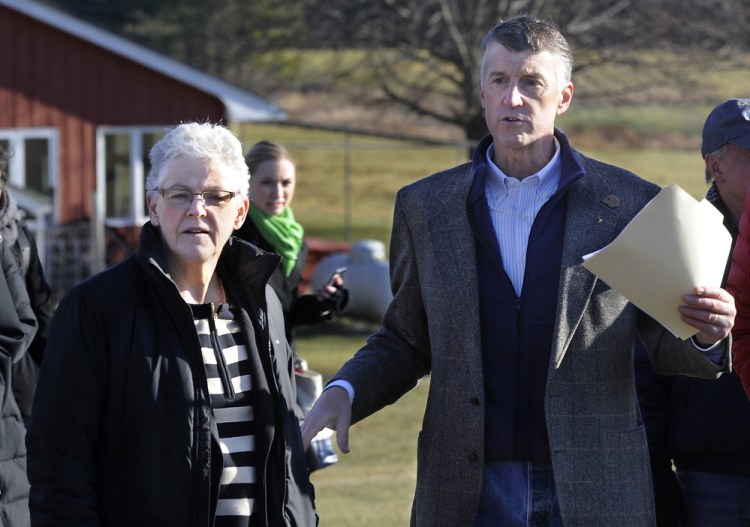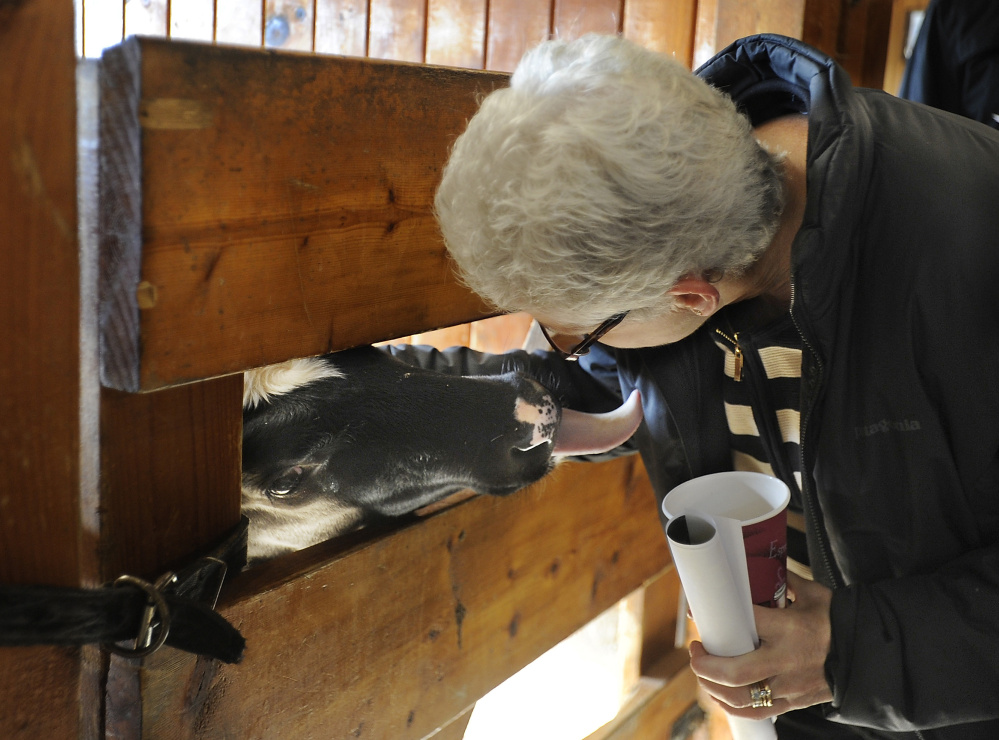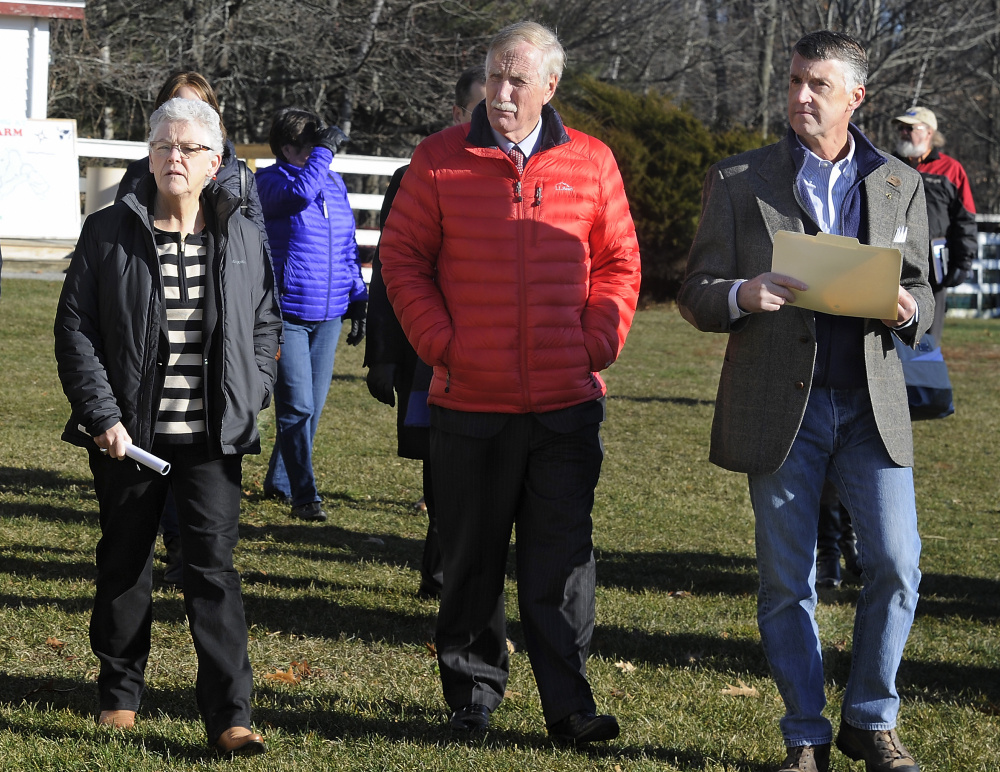WESTBROOK — The head of the U.S. Environmental Protection Agency pledged Monday to address concerns about new water quality rules that have met opposition from farmers and developers in Maine and around the nation.
Gina McCarthy, the top administrator of the EPA, met in Westbrook with about a dozen Maine farmers and members of agricultural organizations to discuss new Clean Water Act rules aimed at protecting smaller streams, tributaries and wetlands that often feed drinking water supplies. Federal courts have suspended the rules in the face of several lawsuits, and Congress has moved to block the EPA in response to concerns that the rules could subject farmers and developers to costly new permits and regulations.
McCarthy, who came to Maine at the invitation of U.S. Angus King, said the EPA does not intend to require new permits for farmers and has specifically exempted agriculture operations. But McCarthy acknowledged the agency as well as the U.S. Army Corps of Engineers, which issues permits under the Clean Water Act, need to do a better job clarifying the rules.
“The Senate is challenging us, and rightly so, to make sure that we are answering the questions that the agriculture community continues to have,” McCarthy said, referring to a Nov. 4 Senate resolution disapproving the rules. “We think we did a good job on that, but we need to make sure that everybody is convinced. And the Senate is right: The proof is in the implementation. And we really need to be very clear about how the Army Corps and the EPA are going to implement this rule.”
The EPA developed the rules after two U.S. Supreme Court cases raised doubts about whether smaller waterways were covered by the Clean Water Act, the federal law that regulates pollution discharges into waterways. The EPA estimates that the new rules would place an additional 3 percent of the country’s waterways under Clean Water Act jurisdiction. But opponents, led by the ag industry, portray the rules as federal overreach that could force farmers to obtain permits for drainage ditches or ponds and impair their ability to reclaim former farmland.
The latter is a major concern in Maine, where the number of farms – especially smaller operations – is growing amid a resurgence in demand for locally produced food.
Penny Jordan with Jordan’s Farm in Cape Elizabeth said she wanted to know whether people who bring former farmland back into production would have to meet a higher standard and, if so, what that could mean for expanding agricultural production in the state. Jordan said McCarthy reassured the group about the exemption, but she hopes to see more clarification on the issue.
“I think it went very well and the administrator, Gina McCarthy, did a good job of explaining what the intention is” of the rules, Jordan said. “The challenge is implementation.”
McCarthy met with representatives of Maine’s major agricultural industries, from potato and blueberry growers to organic farmers. McCarthy said before the meeting that she saw “great value” in addressing the questions raised by Maine farmers, noting that small farmers represent the growth of the agricultural industry.
“And we want to encourage that, certainly not discourage it,” she said.
Prior to the round-table meeting, Warren Knight gave McCarthy and King a tour of his family’s Smiling Hill Farm during which he explained that farmers are heavily invested in protecting water quality. Afterward, Knight said it was “a coup” to have a member of the president’s Cabinet come to Maine to personally talk with farmers about their concerns about the new rules or the regulatory climate in general.
Knight said among Smiling Hill Farm’s biggest concerns is that federal agriculture rules take into consideration the differences between farming in New England and large-scale agriculture elsewhere. In the past, New England’s diverse agriculture sector has “gotten short shrift” because farm rules have been tailored to large, Midwestern or Western farms that often have only one or two crops.
“I think what we were able to impart to the administrator is there is a thriving agricultural movement in New England that deserves consideration and is very different from what we are seeing in other areas of the country,” Knight said.
McCarthy offered to meet with farmers in Maine after King, I-Maine, and 10 Democratic senators sent a letter to her following Senate votes on a bill and resolution to block the rules. All 11 senators opposed the bill and resolution but warned they could be persuaded to support future bills to revise the rules “should the EPA not provide this clarity or enforce this rule in a way that erodes traditional exemptions.”
King said afterward he was pleased with the dialogue.
“I would say people got their questions heard,” King said. “She answered a lot of questions but I think there are more still. … But I think it’s a benefit to having the EPA administrator, who is a Cabinet member, here in Maine to hear from farmers.”
Farmers are not the only industry paying close attention to the rules, however. Maine’s forestry companies, developers and golf course owners have also raised concerns about possible implications of the Clean Water Act expansion.
Robert Searle, superintendent of the Abenakee Club golf course in Biddeford Pool, said it was unclear to him and others in the industry whether the rules could affect fertilization, golf greens aeration, drainage or other aspects of golf course management. Rather than more clearly defining policies, the rules have made deciphering the industry’s obligations even harder, said Searle, who serves as vice president of the Maine Golf Course Superintendents Association.
“Do we have to hire environmental companies to let us know what we are doing is OK?” Searle said.
Send questions/comments to the editors.






Comments are no longer available on this story